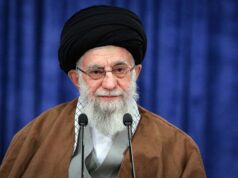At the United Nations last week, Libyan strongman Muammar al-Qaddafi showered U.S. President Barack Obama with unexpected praise, telling the heads of state and dignitaries assembled that he hoped Obama could “stay forever as the president.”
This was hardly a flattering endorsement for Obama. Qaddafi has been tied to countless acts of terrorism including the bombing of Pan Am Flight 103 over Lockerbie, Scotland in 1988 and the bombing of a German nightclub packed with U.S. servicemen in 1986.
The endorsement from the “mad clown of Tripoli,” as President Ronald Reagan called him, is not an isolated incident. Scores of other dangerous despots, terrorists, and anti-American mouthpieces have come out in support of Obama’s foreign policies, which include ambivalence about the U.S. presence in Iraq and Afghanistan, wavering support for Israel, and a diminished sense of American exceptionalism.
It began when candidate Obama ran on a foreign policy platform of what scholar Robert Satloff later described as “anti-Bushism.” Whereas George W. Bush sought to confront rogue regimes and radical ideologies, Obama sought to find understanding with them.
Cuba, which earned sanctions and isolation for decades of support for terrorism, was heartened by Obama’s campaign promises to ease restrictions on Cuban Americans traveling to Cuba that were imposed by the Bush administration. Accordingly, Raul Castro struck a conciliatory tone in January, saying that Obama “seems like a good man,” and wished him luck.
Similarly, Syria smiled when Daniel Kurtzer stated that peace with Syria, which has a long and incontrovertible record of aiding the Iraq insurgency and supporting anti-Israeli terrorist groups, would be a high priority. Syrian dictator Bashar Assad complimented Obama after his election, calling his victory, “a positive sign” that U.S. foreign policy was changing. Over the summer, Assad even had the audacity to invite the president to meet him in Syria.
Less than a week after Obama’s inauguration, the Taliban terrorist group that had once given safe haven to Osama bin Laden, lauded the new president for his stated goal of closing the prison facility in Guantanamo Bay, Cuba. “Obama’s move to close Guantanamo detention center is a positive step for peace and stability in the region and the world,” read a Taliban communiqué, which also asked Obama to ” void all those evil projects established in the light of Bush’s satanic perspective of instability in the world.”
Venezuelan strongman Hugo Chavez also found reason to celebrate the new U.S. president’s non-confrontational foreign policies. In April, at the Summit of the Americas in Trinidad and Tobago, after noting a more conciliatory U.S. policy towards his regime, he gave Obama a copy of the anti-American screed, The Open Veins of Latin America. Because Obama tolerated these antics, Chavez later said he would give Obama another book: What is to be Done? by Vladimir Lenin.
Two months later, Obama delivered a speech to the Muslim world in which he appeared to distance himself from Israel, exhorting the Jewish state to eschew policies that undermine “efforts to achieve peace.” This earned the president praise from the enemies of Israel in the Middle East. Ahmed Yousef, a spokesman for the Hamas terrorist organization, told al-Jazeera television in Gaza that the President’s speech was reminiscent of Martin Luther King Jr. in its vision. “What he said about Islam was great. What he said about Palestinian suffering and a Palestinian state is great.”
Most recently, Russia cheered when Obama declared his intention to cut missile defense by $1.2 billion in 2010, and to altogether scrap European missile defense. Russian President Dmitri Medvedev, who attributed Russia’s 2008 invasion of Georgia to the “arrogant course of the American administration,” lauded Obama’s decision to scrap missile defense a “responsible move.”
Judging by the overwhelming approval of these nations which often challenge the United States, Obama’s foreign policies are failing to serve American interests. A Wall Street Journal/NBC news poll released on September 24 confirmed this, noting that Obama now “faces significant doubts from the American public” about his “handling of foreign policy.”
When Americans begin to signal their support and terrorist groups and authoritarians begin to howl with disapproval, we can be assured that U.S. foreign policy is serving U.S. interests. For now, however, the President is dangerously off-track.





